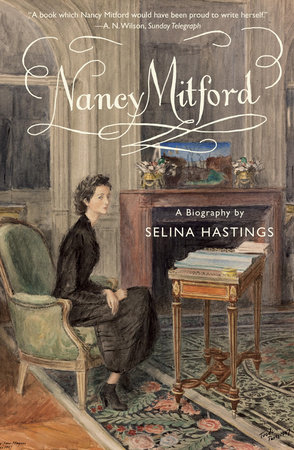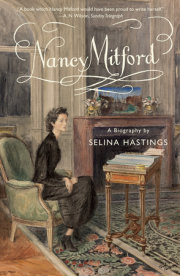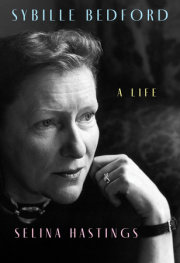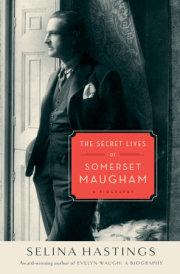CHAPTER ONE
The Beginnings
When Linda, penniless, sinks down on her suitcase in the Gare du Nord and bursts into tears, she knows that nothing so dreadful has ever happened to her before, and that her predicament is hopeless.Then, through her weeping, she becomes aware of somebody standing beside her: ashort, stocky Frenchman in a black Homburg hat. And so begins the great love affair of Linda's life, a love which transforms her existence, breaking her free from the dark and dreary confines of her English past to release her into perfect happiness in Paris, the most beautiful city on earth.
This is how Nancy Mitford tells the story in The Pursuit of Love. A novelist who always wrote with a strong element of autobiography, nowhere does she come closer to the truths of her own life. As it was for Linda, her life, too, was transformed by a short, stocky Frenchman in a black Homburg hat, whom she met not in the Gare du Nord, but in the garden of the Allies' Club in Park Lane. Like Linda, she found in beautiful Paris happiness and freedom of spirit; a freedom, too, from a failed marriage, following years of frustration passed under the iron regime of a tyrannical father.
Both Nancy's parents were the children of remarkable men, and in both cases the remarkable qualities of their fathers passed them entirely by, to reappear again, at full strength and in a number of strange permutations, in the succeeding generation. Nancy's father, David Mitford, second Baron Redesdale, was descended from a long line of landed gentlemen, locally distinguished but of small importance in the history of the nation, whose fortunes were founded in the fourteenth century by one Sir John Mitford of Mitford in Northumberland. To him were granted the lands and tenements of Molesdon in that county, from which was derived the three little moles on the Mitford family crest. David Mitford's great-great-grandfather was the historian William Mitford, author of The History of Greece, a monumental work now forgotten although much admired in its day. David's father, Bertram Mitford, born in 1837 and created Baron Redesdale in 1902, was the son of Henry Reveley Mitford, of Exbury in Hampshire, and Lady Georgina Ashburnham, daughter of the Earl of Ashburnham, who, after bearing her husband three sons, ran off with the secretary to the British Legation in Frankfurt.
Bertie (pronounced 'Barty'), eight at the time of his mother's defection, was sent to Eton at the age of nine, and from there to Oxford. Before going briefly into politics, he went first into the Diplomatic Service, making a distinguished career for himself in St Petersburg and then in the Far East, in China and Japan. He was one of the first two foreigners to be presented to the Mikado, who awarded him the Grand Cordon ofthe Rising Sun for his translation of a collection of Japanese legends, and in recognition of his knowledge and love of the country. At thirty-seven Bertie married Lady Clementine Ogilvy, daughter of the Earl of Airlie. The Airlies, a grand and old-established Scottish family, were not pleased with the match as Bertie had the reputation of being something of a rake (a reputation not improved by his close friendship with the Prince of Wales), and to the day of her death Lady Airlie addressed her daughter's letters to 'Lady Clementine Ogilvy'. When his father died, Bertie inherited land and a large Georgian house, Batsford, in Gloucestershire, where he and Clementine brought up their nine children, and where Bertie established a wild and exotic garden on the bleak Cotswold hillside that rose in front of the house.
It was at Batsford that Nancy's parents, David and Sydney, first met, their two fathers, Bertie Mitford and Thomas Gibson Bowles, having become friends when they were both returned as Conservative Members of Parliament in the General Election of 1892. Bowles, or 'Tap' as he was always inexplicably known, was every bit as clever as Bertie, and in old age the two men looked rather similar, two handsome old walruses with brilliant blue eyes and thick white moustaches. Tap was born in 1843, the illegitimate son of Thomas Milner-Gibson, a Liberal Member of Parliament, and of Susan Bowles, daughter of a brush-maker from Southwark, who was in service in the Milner-Gibsons' household. He was sent to school in France, a country he loved, insisting for the rest of his life on keeping French hours, which meant a full dejeuner at 11.30 in the morning and nothing else until dinner. At nineteen, he was set to work by his father as a junior clerk in the Legacy and Succession Duty Office at Somerset House, a job which he hated, abandoning it after six years for a career in journalism. He covered the Siege of Paris in 1870 for The Morning Post, and at twenty-six, with two colleagues, founded the satirical magazine, Vanity Fair, and some years later The Lady, a journal for women still published today.
In 1876 Tap married Jessica, the daughter of Major-General Charles Evans-Gordon. They had four children, two boys followed by two girls, before Jessica died at the age of thirty-five. As soon as they were old enough the boys, Geoffrey and George, were sent away to school, but their sisters, Sydney and Dorothy (Weenie), were brought up at home, very much under the eccentric influence of their father. In many ways Tap was a modern father, believing in fresh air and exercise, plain food and natural remedies, unconventional theories for an age in which four large meals a day was the custom, with often a little carriage exercise the only aid to digestion. Even more unconventional, Tap liked to have his daughters with him; cumbersomely dressed in stiff serge sailor-suits made specially at Gieves, Sydney and Weenie accompanied their father wherever he went: shooting in Scotland; on his long and dangerous sea-voyages (sailing was a passion he had inherited from his father); on his yacht during the summer season at Deauville with his artist friends, Boldini, Tissot and Helleu; and back in London, paying calls on the fashionable ladies of Pont Street and Belgrave Square, who were not always entirely delighted to have to receive into their drawing rooms two quaintly-dressed and silent little girls. From the age of fourteen it was Sydney who ran the household, a responsibility she enjoyed, being good at adding up and keeping accounts, although she hated having to deal with the men servants who were often insolent and drunk.
It was in the winter of 1894 that Bertie Mitford asked Tap if he would come and speak for him at a political meeting,stay at Batsford, and of course bring the children. The Bowleses went down by train, were met at the station by a waggonette and pair and driven to the house, where they were shown into the library, Tap going first, the two girls in their hated sailor-suits trailing behind. Bertie and Lady Clementine were standing before a blazing fire; and there, with his back to the fire and one foot on the fender, dressed in a shabby velveteen jacket such as gamekeepers wore, was David Mitford. At seventeen, he was already startlingly handsome. Sydney, three years younger, fell in love with him at once.
David, the second son, was the most wayward of the nine Mitford children. Given to sudden, uncontrollable rages, he also had a habit of falling mysteriously and frighteningly ill whenever he was thwarted in what he wanted to do. His interests were entirely out of doors and it was with great difficulty that his tutor ever persuaded him to open a book. Later he was sent not to Eton with his elder brother Clem, but to Radley, which he loathed, and from where it was intended he should enter the Army. However, when the time came, he failed the examination into Sandhurst, and so was packed off instead to be a tea-planter in Ceylon, an experience which taught him two things: the destructive effects of alcohol (tea-planters were notoriously heavy drinkers), and the word 'sua', Tamil for 'pig', which, spelt 'sewer' and applied to most of the people he knew, became his favourite, and most famous, term of abuse. He was back from Ceylon at the outbreak of the Boer War, when he joined the Royal Northumberland Fusiliers, fought gallantly in South Africa, and was invalided home in 1902 with one lung shot away. (Brought back to camp after four days in a bullock-waggon, wound swarming with maggots, was a story much loved by his children.)
David and Sydney were married at St Margaret's, Westminster, on February 6, 1904. There is no question that David was very much in love: there is no knowing what Sydney felt. Having lost her heart to David at the age of fourteen, she soon fell out of love with him, and as a young girl had had several admirers, the most serious of whom was killed in 1900 in the South African War. She once told her eldest daughter that two years after Nancy was born she had been on the point of running away with another man, but had stayed for the sake of the baby. ('Which I doubt, since we know what I looked like at that age,' said Nancy.)
They were a remarkably handsome couple. David at twenty-five was tall and lean, with a smooth, buff-coloured complexion and fierce blue eyes. Sydney's beauty had an other-worldly air about it, a vague look, a look of beautiful boredom, as though her own very private life were going on deep inside, leaving her detached from the world and its people. She seemed possessed of the sort of inner tranquillity that comes to those who have risen above the passions of daily life to enter into some personal nirvana. Nothing ruffled her, nothing outwardly disturbed that Buddha-like serenity, a serenity which, however, concealed a strong character and an absoluteconviction that whatever she believed was right.
They spent their honeymoon in Paris, both speaking good French and both having inherited from their fathers a love of France. On their return to London they stayed in Tap's house in Lowndes Square while their own, No. I Graham Street, was being prepared. Graham Street, just south of Eaton Square, was then very modest indeed, a Victorian terrace of mean little brick houses, with No. I, by far the largest and elegantly faced in cream-coloured stucco, the only one of distinction.
By early summer the Mitfords had moved in, settling down contentedly to a married life that was quiet as much from choice as from necessity. Money was short. They were entirely dependent on the modest allowance Tap made his daughter, and on the income from the job he provided for his son-in-law as business manager of The Lady, a less congenial post than which could hardly have been imagined: David hated being indoors, knew nothing of women's magazines, and had no interest whatsoever in the printed word. (The only book he admitted to having read was Jack London's White Fang, which he thought so good he never had the least desire to read any other.) To make his day bearable, he bought a mongoose with which he hunted the rats on The Lady's Covent Garden premises.
At home in Graham Street Sydney had few demands on her time. There were five servants, all female as she refused to employ men after the unpleasant experience of her father's drunken footmen. This meant that, having seen the cook in the morning, she was free to pay calls, read, and go shopping at the Army & Navy Stores in Victoria Street. This establishment was important in the lives of both Mitfords. When living with Tap in Lowndes Square, Sydney had gone there every Tuesday to order the groceries for the week, afterwards taking the lift to the top floor where she and Weenie had tea. This was a treat; it had made her fond of the place. To David, the Stores were reliable purveyors of those sacred articles, guns, traps and fishing-rods, and to choose these he liked to be there sharp at nine o'clock, before, as he put it, he could be impeded by inconveniently shaped women.
Occasionally they dined with relations but, although Sydney quite enjoyed social life, her husband did not. There was perfectly good food to be had at home, he said, and he preferred the company of his wife to that of anyone else. His favourite way of passing the evening was with Sydney in the drawing-room with a supper of bread and milk on their laps eaten in their dressing gowns in front of the fire. Such a picture of domestic peace is hard to reconcile with the known facts of David's temperament, with David the small boy of violent and unpredictable rages, or, as later portrayed by Nancy, as the frightening and irascible Uncle Matthew, grinding his teeth and bellowing with anger. But in the early days of his marriage, and before the arrival of that large and troublesome family, he was too happy to be anything but calm. And there was another reason for his contentment: within a few weeksof their return from France, Sydney found that she was pregnant.
David was ecstatic. 'I never dreamt of such happiness,' he wrote to his mother. 'I had never any idea of what it would belike – Now I hardly think of anything else ... Sydney will make just such another mother as I had so he ought to be a very happy little boy.' By the middle of November the birth was due, and at six o'clock in the evening of the 28th, after a difficult labour lasting nearly fourteen hours, the baby was born. It was not a boy: it was a girl. Her name was to be Ruby.
Sixteen years later, Mabel the parlourmaid knew at once by the grim expression on his Lordship's face that the news was bad, that yet another girl, the sixth, had been born. But, in November 1904, these disappointments were all in the future. Sydney had survived, the baby was perfect, and David, although appalled at the sufferings his wife had endured, was supremely happy. Once he had seen for himself that Sydney was in no danger-'I cannot tell you how sweet and brave she has been all through' -he was able to turn his attention to his daughter. 'The baby is splendid 9 1/2 lbs at birth and the pretiest [sic] little child you could see . . . Our happiness is very great ... Sydney sends her love and Ruby would if she knew.' Although the birth had left her weak, Sydney was determined to nurse the baby herself in spite of the considerable discomfort this caused, making her dread the frequent intervals at which the child was brought to her. But within a week the pain had subsided and she was sitting up in bed looking pink-cheeked and pretty, and feeling well enough to have second thoughts over the choice of a name. As a boy had been so confidently expected, little time had been spent over the bread and milk considering names for a girl. Ruby she did not care for; she preferred, as a reminder of the sea-faring ballads of her nautical past, that the baby should be called Nancy. And Nancy she was christened on January 26, 1905.
Copyright © 2012 by Selina Hastings. All rights reserved. No part of this excerpt may be reproduced or reprinted without permission in writing from the publisher.







